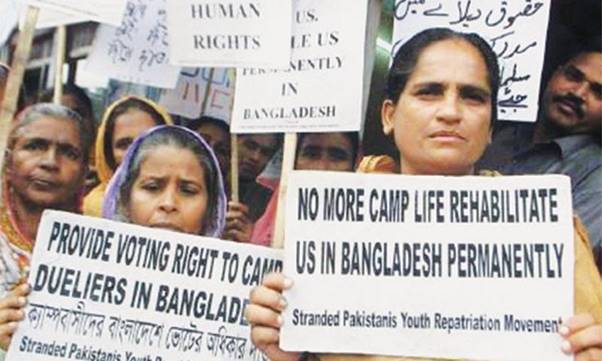
"The Pakistanis certainly have a moral obligation to take at least all those Biharis whose loyalty to them in Bengal was the cause of their present predicament. The Pakistani government owes them more than expressions of concern." - Ben Wathekar, 1972, as part of the Minorities Group Report, UK. These words from 1972 still ring true today – Photo Dawncom
Omoiyari for Biharis in Bangladesh's Ghettos
By Dr Rakhshinda Perveen
Islamabad

Disparity, deception, denial and dismissal manifest in many ways - especially when it comes to the remarkable sacrifices of Pakistan's selfless patriots from various segments of society. Just recall and reflect on certain dates and events in Pakistan's context.
For instance, Human Rights Day on December 10 passes without even mentioning the trafficking of raped Bihari women from former East Pakistan to the brothels of Calcutta, India. The OIC, which once provided financial assistance to sustain the 66 shanty camps in Bangladesh housing around 300,000 unfortunate people after the surrender on December 16, 1971, no longer presses Pakistan to facilitate the Biharis' return. After some initial repatriation efforts, flights from Pakistan for these forsaken people ceased and they were never brought back due to misplaced priorities. According to a 1998 AFP report, then-Prime Minister Nawaz Sharif made a firm commitment to repatriate the Biharis once sufficient funds were raised. Since 1988, a joint Pakistani-Saudi NGO, the World Muslim League, has reportedly been providing funds to run these so-called camps.
From a patriotic perspective, consider the paucity of passion on Pakistan Day, Independence Day, and even the country's defense-related days. There is a total erasure of the massacre of army families by the rebelling East Pakistan Rifles. December 5, 1971, is a date drenched in the blood of Major Muhammad Akram, a 33-year-old Pakistani Army officer from Jhelum and recipient of the Nishan-e-Haider. Pakistan never bothered to bring back his remains that lie in Bangladesh. The heroic 20-year-old Pilot Officer Rashid Minhas, who sacrificed his life on August 20, 1971, earning the Nishan-e-Haider, is widely remembered. However, too few know that Bangladesh has not forgotten to honor Flight Lieutenant Mati Ur Rahman, who was posthumously awarded their highest military honor, despite being considered a traitor to Pakistan. This story is rarely told in popular media.
There was also MM Alam of the Pakistan Air Force - yet he is not celebrated as he deserves to be. The mistreatment he endured due to his Bihari ethnicity and uncompromising honesty is absent from popular anecdotes. For the younger generation, patriotism, truth, and standing up for the powerless have taken on different meanings.
The plight of one of the most marginalized minority communities in Bangladesh provides an excellent case study for those wishing to observe repeated, shameless instances of unfairness, bias, and contradictory actions and inactions by the successive governments, mass media, digital media, civil society activists and the intelligentsia. Typically, minorities garner recognition from progressive and liberal segments of society, yet the Bihari community is uniquely disqualified from such support. Over the years, I have mourned, protested, and advocated to draw the attention of human rights and women's rights commissions in Pakistan to this community, but all in vain. Today, it is drama and evasion that capture attention. Who commands the spotlight? Look at the tweets from Pakistan's highest-earning TV anchors and vloggers. Anti-army, anti-Pakistan and anti-poor narratives, masked as "truth", gain traction and go viral. Amidst all this distraction, the truths about 1971 remain buried, left to fade into misplaced history.
As I grow older in the elite capital of the Islamic Republic of Pakistan, I am recognizing the multilayered prejudices of a vast majority of Pakistani nationalists, liberals, feminists, human rights activists, and even journalists toward the classic tragedy of my community. Two broader layers exist: first, they do not see us; and second, there is purposeful hostility, humiliation, and hatred. Even people like myself, who are misconstrued as privileged, have hardly any space in print media, literature and cultural festivals and conferences. Even private TV channels do not invite voices to speak on the missing narratives about forgotten Biharis, especially in these times when nearly everyone is euphoric about Bangladesh. The sudden emergence of experts and the sprinkling of friendship vibes, sans these stranded stateless, is nothing but ironic - an epitome of apathy. Apart from legacy media, this Bihari issue has no supporters even on social media.
Many of such emotive perspectives may appear problematic and may alienate many readers. It is understandable that it is wise to bury the past, move forward, and focus on peace and security. It sounds even better - and romantic - to organize music concerts and play cricket matches in our former part. Overlooking the unimaginable violence of the Mukti Bahinis toward unarmed pro-Pakistani Biharis might be seen as a pragmatic approach in an unequal world. Still, some basic truths, no matter how intellectually provoking they may sound, should remain a part of our cognitive awareness and actions.
Remember, no lasting progress or viable relationship can be achieved between Dhaka and Islamabad unless this community receives a sincere apology and atonement. Such an act of maturity and sensibility will not only benefit our establishment but also help restore the rapidly diminishing esteem of many powerful institutions within our homeland.
"The Pakistanis certainly have a moral obligation to take at least all those Biharis whose loyalty to them in Bengal was the cause of their present predicament. The Pakistani government owes them more than expressions of concern." - Ben Wathekar, 1972, as part of the Minorities Group Report, UK. These words from 1972 still ring true today.
The endless exclusion and lack of empathy for the Pakistani Biharis in the ghettos of Bangladesh must be questioned by all who claim to be the custodians of the rights of the weak and defenseless. Above all, Pakistan must honor its decades-old debt to the Pakistani Bihari community - those who stood by the country when it mattered most.
Pakistani Biharis and Bangladeshis need closure through actual healing. Healing must not be confused with sweeping uncomfortable truths under the carpet or ignoring the root causes. This approach only leads to more complications and unresolved issues. It is time to apply an informed empathy lens, such as the Japanese concept of Omoiyari as an intellectual tool to confront the inconvenient truth of the betrayal faced by the stateless Pakistani Biharis (also known as non-Bengali Urdu speakers) abandoned in Bangladesh.
(The writer is a published author and can be reached at dr.r.perveen@gmail.com - The Express Tribune)

